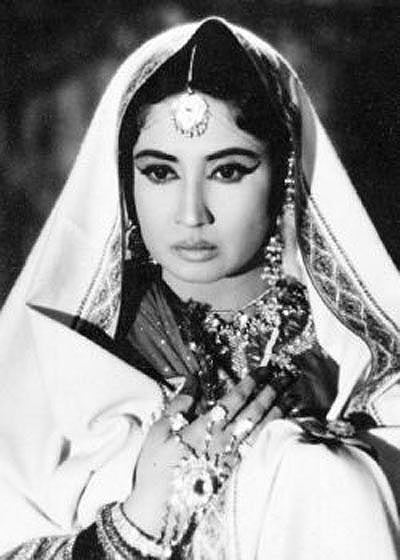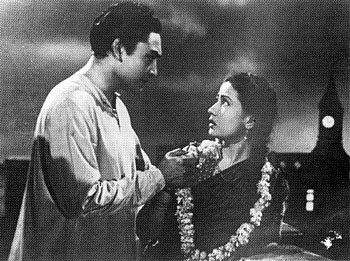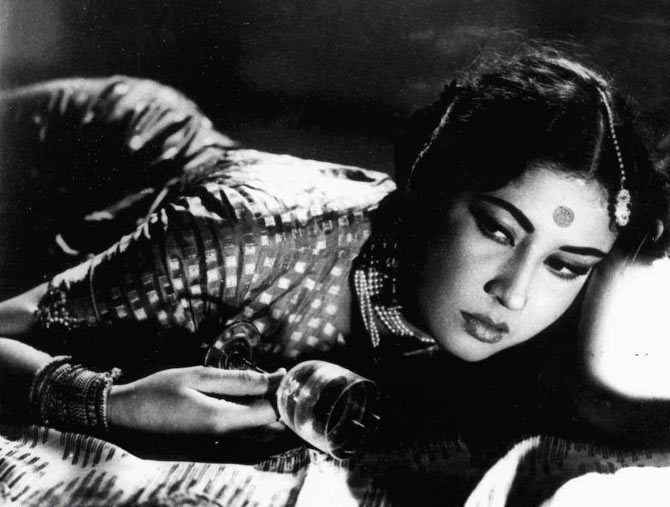 | « Back to article | Print this article |
Meena Kumari: A broken song, a broken heart but not a single regret
A tribute to Meena Kumari on her 42nd death anniversary on March 31.
Meena Kumar, one of Hindi cinema's greatest actresses, has given us many classics to remember her with. From Parineeta and Sahib Biwi Aur Ghulam to Pakeezah, the actress' brilliant work is still watched and loved today.
Rinki Roy Bhattacharya, daughter of noted filmmaker Bimal Roy, pays tribute to Meena Kumari.
The entire floor of the studio set was strewn with black electric wires coiled like reptiles. We waded through them gingerly one morning many years ago, careful not to trip or get electrocuted.
In a remote corner, we saw a roll top desk. Before the desk sat a fair, slim lady dressed in a cotton Bengali handloom sari.
The pencil in her right hand danced about as she twirled it, looking pensive.
The make-up man hovered nearby with his powder puff.
The lady sat under powerful arclights. People stood around waiting for something to happen.
And something did happen quite soon.
We heard a startling yell: 'Silence!'
At once, a great hush fell on the floor. Every one stood consciously still. The next words heard were:
'Action, start camera!'
And a voice answered: 'Rolling.'
The clapper boy quickly ducked with a small board towards the young woman sitting silently before her desk.
The board simply said: ‘Muhurat shot: PARINEETA’
The clapper boy shouted 'Muhurat shot: Take one.'
The very first take was declared okay. Around us everyone clapped. Boxes of peda were passed around. The young lady got up -- the make-up man rushed to dab her face.
These memories of her perfumed presence are vivid.
Please click Next to see more.
'I saw Meena Kumari every day during the making of Parineeta'
The first darshan I had of the screen diva, known famously as Meena Kumari, was on the sets of Parineeta.
Not yet the star, she was barely 19 years old at the time.
Mahajabeen, rechristened Meena Kumari by filmmaker-screenwriter Vijay Bhatt (director Vikram Bhatt’s grandfather), was born on August 1, 1932/3. From her elegant Bengali danseuse mother Prabhavati (her father Ali Bux’s second wife) Mahajabeen inherited grace and a radiant beauty that had a gossamer like delicacy.
I saw her every day during the making of Parineeta. I didn’t just see her; I experienced her gentle perfumed presence.
It so happened, one morning Ma declared that we need not go to school. I wondered, had the world stopped in its orbit?
My father, it seems, wanted real children for a song sequence in his film Parineeta. He rounded up his two daughters along with the children of technicians for the song Gore Gore Hatton Mien.
After struggling into our little saris, we headed for the Bombay Talkies Studio down the road. In the makeup room mirror, I saw my face change dramatically with pancaked cheeks and red lips.
As we were being turned into child actors, Meena Kumari, Parineeta’s heroine, stepped in, beaming at us. Suddenly, she touched my unpierced earlobes in disbelief.
Her quick exit was followed by her equally swift return, with a handful of ear clips. She snapped a pair on my poor lobes, making me grimace.
But I had soared high with self pride. It was absolutely, divine being on the sets with this beautiful star, this perfumed diva.
The phenomenal success of Baiju Bawra and Parineeta catapulted Meena Kumari to stardom.
Her heady romance with director Kamal Amrohi was hush-hush but no secret. Amrohi, who called her Manju, used to hang around the studio that had made him famous for films like Mahal.
What was a secret was the couple’s ugly falling-out. It is said that Amrohi gave her a triple talaaq -- and out Meena Kumari went from his home at Rembrant, never to return.
In the brief 39 years that she lived, Meena Kumari attained the star status that others can only dream of.
'Meena Kumari did not have Rs 3,500 required to release her body'
She began her meteoric screen journey humbly as a child star, Baby Meena.
She rose to be India’s number one female star, the greatest Tragedy Queen, with extraordinary histrionic talent.
No other actress has won as many Best Actress awards.
All through life, grim tragedy dogged her. Serious bouts of illness, financial hazards, numerous love affairs, the many betrayals, drinking binges, physical abuse... nothing dulled the great star’s sense of humour nor did her magnanimity ever falter.
She was as sincere a friend and as loyal a lover, till the very end. Unlike others who attained her high celebrity status, Meena Kumari loved with abandon, without a shred of guilt or shame. Always, without regret.
In this she was a uniquely radical woman. She was far ahead of her times.
Playing that unforgettable part in Abrar Alvi’s Sahib Bibi Aur Ghulam, she once told the director: ‘It is funny but I think I have become Choti Bahu in real life!’
At her death, Satyajit Ray lamented: ‘I saw her Sahib Bibi Aur Ghulam which impressed me. She was undoubtedly an actress of the highest calibre.’
When this actress of high calibre, the reigning Goddess of cinema breathed her last on the afternoon of March 31, 1971, at 3.25 pm in St Elizabeth’s nursing home, she did not have Rs 3,500 required to release her body.
It was a miracle when her physician bailed out the family.
On the last journey to Bandra, the police had a tough time controlling thousands waiting outside her Landmark flat on Carter Road to bid her a tearful adieu.
A diehard romantic and a poet, long before her final farewell Meena Kumari had authored her own epitaph.
She ended life with a broken fiddle
With a broken song
A broken heart
But not a single regret
Mahajabeen


